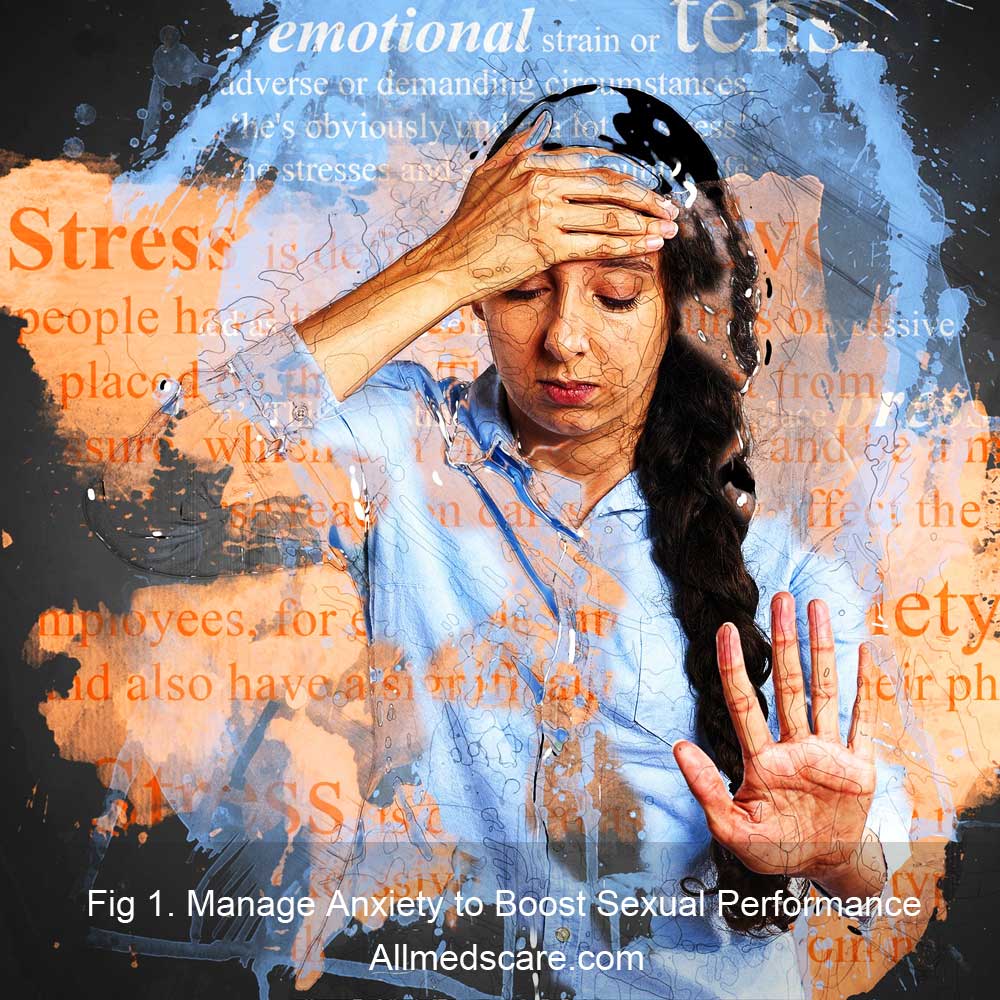
How to Manage Anxiety to Boost Sexual Performance?
Anxiety is a natural reaction to stress and can be experienced in different ways. While it is common to feel uneasy while engaged in intimate activities, it is crucial to take efforts to minimize anxiety if these feelings become overwhelming or impair your sexual performance.
Anxiety can have both physical and psychological effects on sexual performance. Physiologically, anxiety can cause poor circulation and decreased libido leading to difficulty maintaining an erection or reaching orgasm.
Psychologically, anxiety can increase fear or self-doubt that interferes with the ability to relax and enjoy the moment, leading to further difficulties in arousal or climaxing.

The Physical Effects of Anxiety on Sexual Performance
The physical effects of anxiety on sexual performance are very distressing. Anxiety symptoms, such as increased heart rate, sweating, and tremors, can interfere with a person’s ability to feel arousal or experience emotion. This is because elevated arousal frequently triggers an increase in adrenaline, which in turn stimulates the sympathetic nervous system and causes further physical symptoms of stress like shallow breathing, tense muscles, and trouble concentrating.
At the same time, anxious thoughts can also lead to avoidance behaviors such as withdrawing from the physical touch needed for intimacy.
On a physiological level, worry can have detrimental effects on how well a person engages in sexual activity by lowering the arousal levels necessary for orgasmic satisfaction. Due to elevated cortisol levels released during times of stress, people may experience lower libido when dealing with stressors connected to sex or relationships, which limits their desire for sexual activity.
Also, the body requires proper circulation to maintain erections and reach the climax; yet, when blood flow is restricted due to stress, it is substantially harder to feel and enjoy sexual activity.
The Psychological Effects of Anxiety on Sexual Performance
Feelings of inadequacy or embarrassment might result from the psychological effects of worry on sexual performance. It might be challenging to become aroused or reach orgasm due to negative thoughts and self-doubt, which makes it tough to relax and enjoy the moment.
People struggling with anxiety may also experience a decrease in libido due to stress hormones released during moments of distress, resulting in a limited desire for intimate activities.
Fear is another common emotion that can interfere with sexual functioning. Fearful thoughts often make people feel as if they are not good enough or unable to perform adequately which leads them away from engaging in intimacy altogether. This fear may manifest itself physically by tightening muscles and suppressing arousal signals from the body, leading to difficulty becoming sexually aroused or achieving orgasm.
How to Reduce Anxiety and Improve Your Sex Life
One of the main ways to reduce anxiety and improve sexual performance is to find ways to relax. This can be done through yoga, meditation, deep breathing exercises, or other types of activities such as taking a warm bath and listening to soothing music.
Relaxation techniques are especially helpful in managing stress levels before engaging in intimate activities by helping the body release tension and become more receptive to physical touch and arousal signals.
Another way to reduce anxiety during sex is to communicate one’s needs openly and honestly with one’s partner. Both partners must be comfortable talking about what they want from each other so that any concerns about performance or happiness can be addressed directly.
Managing Stress and Anxiety
Adopting self-care practices is an important part of managing stress and anxiety related to sexual performance. Self-care activities such as yoga, meditation, and deep breathing exercises are great ways to relax the body before engaging in intimate activities. These relaxation techniques help reduce physical symptoms of stress by allowing deep breathing to increase oxygen levels in the body which improves overall circulation.
Self-care can also be helpful psychologically since it lessens anxiety and ruminating over past mistakes or potential results, which fosters a calmer state of mind before engaging in sexual activity.
Improving communication with your partner is another important factor in managing sex-related stress and anxiety. Because open communication between both parties allows any concerns about performance or happiness to be addressed directly without fear or uncertainty. This helps create an environment of trust where each partner feels more comfortable expressing their desires and respects each other’s boundaries resulting in increased emotional intimacy that leads to an overall pleasurable experience.
Communication also provides people with the opportunity to share what they find pleasurable. So that both partners can gain a better understanding regarding how best to approach satisfying encounters together moving forward free from judgment or shame.
Similarly, anxiety causes many problems in sexual function such as erectile dysfunction (ED), Premature Ejaculation (PE) in which couples can seek help from professionals who are experts in treating this type of problem, or online medicines are also available for this problem like Cenforce, Super p force, Kamagra Jelly, Penegra, etc.
Conclusion
Reducing anxiety and improving sexual performance is an important parts of a healthy relationship.
Additionally, focusing on building confidence through positive affirmations can help people feel more empowered when engaging in intimacy leading to greater satisfaction both physically and emotionally.
By making small changes towards reducing anxiety, it is possible to create lasting improvements for better sexual performance that will enhance relationships for years to come.





